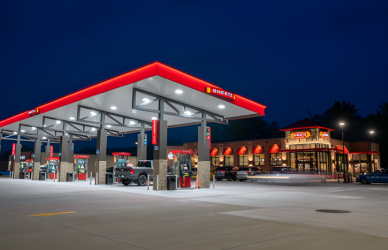The American Trucking Associations (ATA) Management & Conference Exhibition saw a panel discussion led by the ATA’s Chief Economist Bob Costello. In this Oct. 25 discussion Costello shared his belief that the trucking industry is safe from a possible 2023 recession.
“I think that we’re going to have a mild recession early next year,” Costello said. “There’s some really unique things going on in our industry that is going to at least isolate much of us in this room from having anything too difficult.”
The pandemic encouraged consumers’ spending habits to shift away from services and instead toward goods, Costello said. This shift, due to a reduction in people traveling from their homes, increased the demand for freight. The economy has begun to regulate itself to pre-pandemic patterns, once again shifting spending habits back toward services.
“You want to know why 2021 was such a great year for freight?” Costello said. “Spending on goods went up 12.5% last year after inflation. We haven’t seen anything like that in decades. It went up 5.4% in 2020 and it just led to a ton of freight.”
This positions the U.S. economy toward a mild recession, Costello said.
Despite a decrease in spending, it will remain strong, likely staking its claim as the second-highest figure ever recorded.
“I’ve been hearing folks talk about how the market is collapsing,” Costello said. “Let’s go back to 2020 and 2021. What happened to many of you in this room, contract carriers. Your shippers came to you and they said, ‘I’ve got more freight for you,’ and what did you say? You can’t haul it. I don’t have the trucks; I don’t have the drivers. And so, what were they forced to do? They went into the spot market to get all those loads covered and we saw an incredible increase in spot market load postings.”
He shared the statistic that spot market load postings had surpassed 100%, however, as the market has slowed down, load postings have reduced to 65%. Costello also shared that the contract market has revived itself and is healthy once again after a two-year contraction.
“I do think it’ll probably level off a bit or not grow as quick, but by no means has the freight market collapsed on us,” Costello said. “The spot market has because we’re just going back to more normal splits of contract versus spot market.”
These trends differ across trucking modes, Costello said. Tank trucking has been doing well after a period of significant struggle and dedicated dry van is continuing to do well. Costello’s hypothesis is that some carriers have been taking it upon themselves to convert to dedicated routes to best suit their drivers.
“I would call it a bifurcated truck market right now,” Costello said. “So, contract is not bad but spot market is a struggle. If we look at some average revenue per mile on the for-hire truckload side, things are pretty good. It’s up almost 14% last year.”
On the for-hire truckload side, the average revenue is decreasing, however it is much more significant in the spot market. Less-than-truckload is a different market because it has to accommodate surplus freight. That is becoming less of an issue, Costello said.
“Let’s talk about supply because a lot of things have gone on,” Costello said. “When I said this is unlike a market that we’ve ever seen before, it’s this. So, what does this industry almost always do during good times? They go buy a bunch of trucks. We’ve seen it time, after time, after time. What could this industry not do this time? Buy a bunch of trucks. And I think that is what makes a big difference.”











